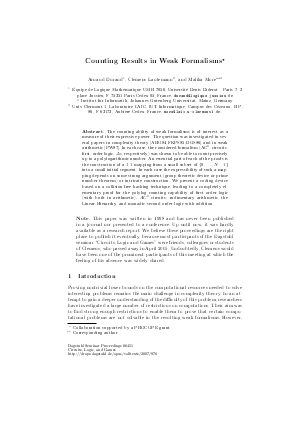Counting Results in Weak Formalisms
Authors Arnaud Durand, Clemens Lautemann, Malika More
-
Part of:
Volume:
Dagstuhl Seminar Proceedings, Volume 6451
Part of: Series: Dagstuhl Seminar Proceedings (DagSemProc) - License:
 Creative Commons Attribution 4.0 International license
Creative Commons Attribution 4.0 International license
- Publication Date: 2007-04-23
File

PDF
DagSemProc.06451.4.pdf
- Filesize: 282 kB
- 11 pages
Document Identifiers
Subject Classification
Keywords
- Small complexity classes
- logic
- polylog counting
Metrics
- Access Statistics
-
Total Accesses (updated on a weekly basis)
0Document
0Metadata
Abstract
The counting ability of weak formalisms is of interest as a measure of their expressive
power. The question was investigated in the 1980's in several papers in complexity theory and in weak arithmetic. In each case, the considered formalism (AC$^0$--circuits, first--order logic, $Delta_0$, respectively) was shown to be able to count precisely up to a polylogarithmic number. An essential part of each of the proofs is the construction of a 1--1
mapping from a small subset of ${0,ldots,N-1}$ into a small initial segment. In each case the expressibility of such a mapping depends on some strong argument (group theoretic device or prime number theorem) or intricate construction. We present a coding device based on a collision-free hashing technique, leading to a completely elementary proof for the polylog counting capability of first--order logic (with built--in arithmetic), $AC^0$--circuits, rudimentary arithmetic, the Linear Hierarchy, and monadic--second order logic with addition.
Cite As Get BibTex
Arnaud Durand, Clemens Lautemann, and Malika More. Counting Results in Weak Formalisms. In Circuits, Logic, and Games. Dagstuhl Seminar Proceedings, Volume 6451, pp. 1-11, Schloss Dagstuhl – Leibniz-Zentrum für Informatik (2007)
https://doi.org/10.4230/DagSemProc.06451.4
BibTex
@InProceedings{durand_et_al:DagSemProc.06451.4,
author = {Durand, Arnaud and Lautemann, Clemens and More, Malika},
title = {{Counting Results in Weak Formalisms}},
booktitle = {Circuits, Logic, and Games},
pages = {1--11},
series = {Dagstuhl Seminar Proceedings (DagSemProc)},
ISSN = {1862-4405},
year = {2007},
volume = {6451},
editor = {Thomas Schwentick and Denis Th\'{e}rien and Heribert Vollmer},
publisher = {Schloss Dagstuhl -- Leibniz-Zentrum f{\"u}r Informatik},
address = {Dagstuhl, Germany},
URL = {https://drops.dagstuhl.de/entities/document/10.4230/DagSemProc.06451.4},
URN = {urn:nbn:de:0030-drops-9767},
doi = {10.4230/DagSemProc.06451.4},
annote = {Keywords: Small complexity classes, logic, polylog counting}
}
